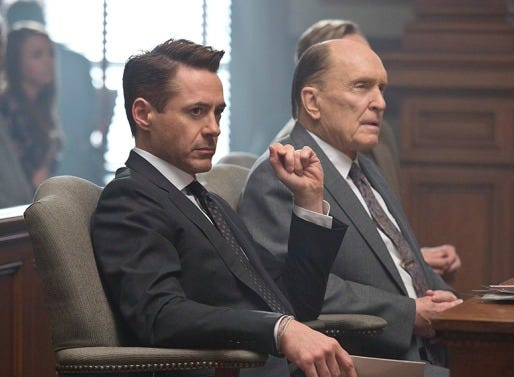The Judge

“The Judge” has all the hallmarks of a labor of love, and all the weaknesses. It features a couple of top-notch performances but it’s overlong and meandering, including a lot of stuff better left on the cutting room floor — or better yet, in the screenwriters’ wastebasket.
The film stars Robert Downey Jr., who is the producer and put the project together with his wife, Susan, to create a legal drama in the vein of “The Verdict” and “To Kill a Mockingbird.” Unlike “The Verdict,” which was a character piece that should’ve won Paul Newman an Oscar, “The Judge” is more of a star vehicle for Downey to do what he does best.
We’ve seen him play this character for a while now, which is a variation on Downey’s own star persona — super-smart guy, light-speed verbosity, can be alternately charming and bullying, a fundamentally good man who sometimes has to convince others, and himself, of that fact.
In this iteration he is Hank Palmer, a high-powered attorney who escaped his hated tiny hometown of Carlinville, Ind., but is called back after a tragedy, and then must deal with another. His opposite is his father, Joseph Palmer (Robert Duvall), an upstanding local judge for the past 42 years who regards Hank as an unwanted guest. There’s obviously an ocean of bad blood between these two.
Nick Schenk wrote the screenplay, later fixed up by Bill Dubuque, from a story that director David Dobkin and Downey (uncredited) came up with. Dobkin is a curious choice, known entirely for comedies both good (“Wedding Crashers”) and not so much (“Fred Claus”).
I think Dobkin needed to stand up to his star/boss a little more, and reel in some of the more sprawling aspects of the story and Downey’s performance. Downey is an amped-up powerhouse of a performer, much in the vein of John Malkovich, and left to his own devices tends to chew up the scenery. He does enjoy a few quieter moments where he’s just reacting to people or circumstances, and those are his best in the movie.
(Full disclosure: I interviewed Dobkin and Downey for a local TV station at the Indianapolis premiere, and had to miss the first 10 minutes or so of the movie to do so.)
Duvall is just splendid, and his performance only seems to grow sharper as the movie goes on. Judge Palmer is cussed and cantankerous, and demonstrates little superficial love to his two other sons, Glen (Vincent D’Onofrio), a former baseball prospect gone to seed, and Dale (Jeremy Strong), the mentally impaired baby who spends most of his time fiddling with 8mm film. To Hank, he shows only open hostility.
Things grow more complicated when the judge is charged with running down a man on a bicycle with his car, and Hank is eventually brought in to defend him, after the local yokel attorney / antique dealer (Dax Shepard) proves spectacularly unequal to the task.
The last half of the movie is mostly taken up by the trial, as Hank faces off with a slick prosecutor brought in special from Gary named Dwight Dickham (an intimidating Billy Bob Thornton), who seems to bear some kind of grudge against the Palmers.
There’s a strong through-line of a narrative in “The Judge,” but also way too many unnecessary elements. We’ve got Hank hooking up with an old flame (Vera Farmiga), who adores Hank for all his faults, including “that hyper-verbal vomit thing you do” — which is a much better description of this Downey trait than the one I gave above.
And there’s drama about the dashing of Glen’s major league dreams, the death of the judge’s wife, a nasty old criminal case that haunts the current proceedings, a visit from Hank’s daughter, a kittenish bartender at the local pub (Leighton Meester) who hooks up with him and is later revealed to be … well, it’s just creepy.
There’s a lot good going on in “The Judge.” But at 141 minutes, it needed a serious editing trim and/or screenplay rethink to hone it down. The essence is a triangle story with Downey, Duvall and Thornton each supporting one leg, and you don’t really need anything beyond that to muddy things up.
3.5 Yaps

